|
|
|
Sort Order |
|
|
|
Items / Page
|
|
|
|
|
|
|
| Srl | Item |
| 1 |
ID:
153358
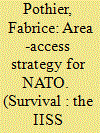

|
|
|
|
|
| Summary/Abstract |
With the decisions taken at the Warsaw Summit in July 2016, NATO crossed a new symbolic threshold. For the first time since the end of the Cold War, NATO will deploy, on a quasi-permanent basis, troops on the eastern flank of the Alliance. This move, touted by the Alliance as historic, is meant to reassure nervous allies and to deter Russia from crossing the sacred border of NATO territory.
|
|
|
|
|
|
|
|
|
|
|
|
|
|
|
|
| 2 |
ID:
153360
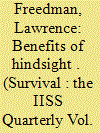

|
|
|
|
|
| Summary/Abstract |
This article draws largely on my experience as the Official Historian of the Falklands Campaign, and then as a member of the UK inquiry into the Iraq War. My aim is to explore the particular challenges faced when charged with holding ministers, officials and officers directly to account. Although I was solely responsible for the Falklands history, I was part of a team working on the Iraq Inquiry, led by Sir John Chilcot. Not only am I speaking for myself, but it is not my intention to offer revelations about the workings of the inquiry.1 In practice, the work was relatively straightforward. Despite pre-publication comments about the length of the report and the time it had taken to prepare, the reasons for this were apparent on publication. The panel stuck together despite irritating and at times intrusive media speculation; the report’s findings did not leak in advance; and any disagreements, which rarely touched on the broad thrust of the report, were always settled without fuss. Compared with other inquiries, we were not even that expensive. Academics and former mandarins come at a discount to lawyers.
|
|
|
|
|
|
|
|
|
|
|
|
|
|
|
|
| 3 |
ID:
153363
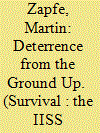

|
|
|
|
|
| Summary/Abstract |
As a nuclear alliance, NATO’s deterrence is ultimately based on the threat of nuclear retaliation. However, Russia under President Vladimir Putin seems to have rejected the established Western playbook, opting instead for ‘cross-domain coercion’1 that transcends conventions in deterrence, most importantly the balance between conventional and nuclear forces. NATO’s answer since 2014 has been largely based on conventional adaptation mirroring similar evolutionary steps in the Alliance’s history. Important as these measures may be, there is a danger that they will fall short of enhancing allied deterrence, and may even be harmful to it, if they do not take into account the essentially political nature of the Russian threat.
|
|
|
|
|
|
|
|
|
|
|
|
|
|
|
|
| 4 |
ID:
153361
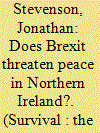

|
|
|
|
|
| Summary/Abstract |
The list of strategic oversights on the part of those who advocated the United Kingdom’s departure from the European Union, known as ‘Brexit’, is dauntingly long. One of the least-discussed challenges, but perhaps the most significant, is the loss of the EU as a conflict-resolution mechanism. Brexiteers appear to have assumed, rather complacently, that this was a question for other European countries, and not for Britain. In so doing, they overlooked a conflict not yet fully resolved – and a peace not yet fully consolidated – at home.
|
|
|
|
|
|
|
|
|
|
|
|
|
|
|
|
| 5 |
ID:
153357
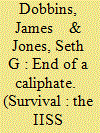

|
|
|
|
|
| Summary/Abstract |
From its peak in late 2014, the so-called Islamic State (also known as ISIS or ISIL) has steadily lost territory and population. As an actual – if unrecognised – state, it is on the verge of extinction. Mosul, its last major stronghold in Iraq, is nearly cleared. Raqqa, its capital in Syria, is surrounded and awaiting an assault. The trend lines are stark. By early 2017, according to our estimates, ISIS controlled approximately 45,377 square kilometres and roughly 2.5 million people in Syria and Iraq. Compared to autumn 2014, these numbers represented a 56% decline in Syria and an 83% decline in Iraq in terms of the Islamic State’s control of people. In Egypt, Libya, Afghanistan and Nigeria, ISIS controlled a combined 7,323km2 and 497,420 people by early 2017, representing a 75% drop in its control of people in Nigeria, nearly 100% in Libya and 87% in Afghanistan. In Egypt, ISIS operates in only a tiny stretch of the Sinai.1 Polling data also indicates declining support across the Muslim world for ISIS and its ideology.
|
|
|
|
|
|
|
|
|
|
|
|
|
|
|
|
| 6 |
ID:
153362
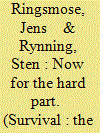

|
|
|
|
|
| Summary/Abstract |
NATO’s July 2016 Warsaw Summit was a crowning achievement in terms of Alliance adaptation. Taking place on the territory of a former Soviet vassal state (Poland), the summit consecrated the Alliance’s embrace of a renewed strategy of deterrence by punishment vis-à-vis Russia. The punishing intent, reminiscent of the Cold War, is made clear in the section of the summit’s declaration on nuclear policy, in which the allies state that
|
|
|
|
|
|
|
|
|
|
|
|
|
|
|
|
| 7 |
ID:
153359
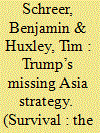

|
|
|
|
|
| Summary/Abstract |
The Trump administration needs an Asia strategy that will reassure its allies and partners there about Washington’s capacity, competence and resolve to retain its position of leadership in the region. Despite early visits by Vice President Mike Pence, Secretary of State Rex Tillerson and Defense Secretary James Mattis to reaffirm America’s ‘ironclad’ commitment to allies such as Japan and South Korea, mixed messaging and Donald Trump’s ‘America First’ doctrine – which apparently remains the administration’s default strategic concept – have continued to generate scepticism and anxiety.
|
|
|
|
|
|
|
|
|
|
|
|
|
|
|
|
| 8 |
ID:
153364


|
|
|
|
|
| Summary/Abstract |
Peace operations have undergone considerable change since the turn of the century. Peacekeepers are deployed in a greater variety of scenarios, ranging from monitoring ceasefires to complex peace operations. The protection of civilians has become an important focus, and operations have become more robust in their use of force to defend their mandates. At least some missions have the explicit purpose of helping to stabilise a country in the midst of an ongoing conflict.
|
|
|
|
|
|
|
|
|
|
|
|
|
|
|
|
| 9 |
ID:
153356


|
|
|
|
|
| Summary/Abstract |
Barring some catastrophic policy blunder by the United States, the Islamic State, also known as ISIS or ISIL, will eventually be defeated. The US-led international coalition that has assembled to fight the most formidable terrorist organisation of modern times overmatches ISIS on every relevant dimension – manpower, lethality, financial resources, global reach. As such, the defeat of ISIS, at least in its current form, is only a matter of time. But the group’s defeat will not resolve all of the questions that have been raised by its emergence. Looking forward, US policymakers will have to decide what to do next in America’s ongoing ‘global war on terror’.
|
|
|
|
|
|
|
|
|
|
|
|
|
|
|
|
|
|
|
|
|